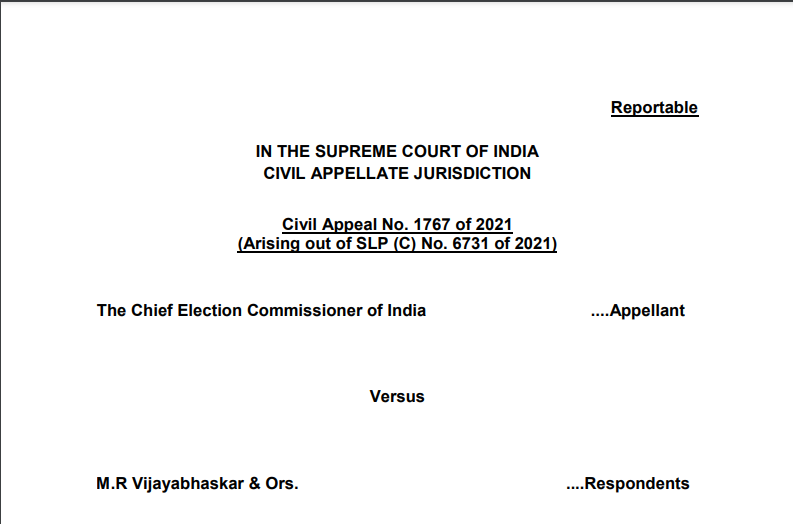SC Order in the case of The Chief Election Commissioner of India Versus M.R Vijayabhaskar
Case Covered:
The Chief Election Commissioner of India
Versus
M.R Vijayabhaskar
Facts of the Case:
A delicate question of balancing the powers of two constitutional authorities in this appeal has raised larger issues of the freedom of speech and expression of the media, the right to information of citizens, and the accountability of the judiciary to the nation. The authority of a judge to conduct judicial proceedings and to engage in a dialogue during the course of a hearing and the freedom of the media to report not just judgments but judicial proceedings have come up for discussion. What are the contours which outline judicial conduct? What are the concerns courts must be alive to in an age defined by the seamless flow of information? What purpose does the media serve in a courtroom? Above all, in a constitutional framework founded on a classical scheme of checks and balances, can a constitutional body – in this case, the Election Commission of India– set up a plea that constitutional status is immunity from judicial oversight? Each of these components will be addressed in this judgment.
This Special Leave Petition arises from an order dated 30 April 2021 of a Division Bench of the High Court of Judicature at Madras. The High Court entertained a writ petition under Article 226 of the Constitution to ensure that COVID-related protocols are followed in the polling booths at the 135- Karur Legislative Assembly Constituency in Tamil Nadu. During the hearings, the Division Bench is alleged to have made certain remarks, attributing responsibility to the EC for the present surge in the number of cases of COVID-19, due to their failure to implement appropriate COVID-19 safety measures and protocol during the elections. At issue are these oral remarks made by the High Court, which the EC alleges are baseless, and tarnished the image of the EC, which is an independent constitutional authority.
On 26 February 2021, the EC announced general elections to the Legislative Assemblies of Tamil Nadu, Kerala, West Bengal, Assam, and Puducherry. The schedule of elections in the State of Tamil Nadu involved polling on 6 April 2021 and counting of votes on 2 May 2021. While preparing for the elections, the EC issued a letter dated 12 March 2021 to the presidents and general secretaries of all national and State political parties emphasizing the observance of instructions related to COVID-19 protocol during the elections. During the polling phase, the EC issued another letter dated 9 April 2021 to political parties stating that norms of social distancing, wearing of masks, and other COVID-19 related restrictions, were not being followed by candidates set up by political parties. It also noted that in case the breach of norms continued, the EC would consider banning public meetings and rallies. Eventually, the EC by an order dated 16 April 2021 banned rallies, public meetings, and street plays during the days of the campaign between 7 pm and 10 am. Another letter was issued on the same day re-emphasizing strict adherence to COVID-19 related safety protocols.
Related Topic:
SC in the case of ALD Automotive Pvt. Ltd. Vs Commercial Tax Officer
Observations of the Hon’ble Court:
We are tasked with balancing the rights of two independent constitutional authorities. On one hand is the Madras High Court, which is a constitutional court and enjoys a high degree of deference in the judicial structure of this country. The High Courts perform an intrinsic role as appellate courts and as courts of the first instance in entertaining writ petitions under Article 226 (and as courts of original civil and criminal jurisdiction in certain cases). They are often the first point of contact for citizens whose fundamental rights have been violated. High Courts are constantly in touch with ground realities in their jurisdictions. During the COVID-19 pandemic, the High Courts across the country have shown commendable foresight in managing the public health crisis which threatens to submerge humanity. Their anguish when they come face to face with reality must be understood in that sense. On the other hand is the EC, a constitutional authority tasked with the critical task of undertaking superintendence and control of elections under Article 324 of the Constitution. The EC has facilitated the operation of our constitutional democracy by conducting free and fair elections and regulating conduct around them for over seven decades. Its independence and integrity are essential for democracy to thrive. This responsibility covers powers, duties, and myriad functions which are essential for conducting the periodic exercise of breathing life into our democratic political spaces.
Today, the Court has not been called upon to determine the constitutionality or legality of the actions of the EC in its conduct of the Assembly elections in the five states. In restricting ourselves to the specific grievances that have been urged by the EC, regarding the remarks made by the judges of the Madras High Court, we find that the High Court was faced with a situation of rising cases of COVID-19 and, as a constitutional Court, was entrusted with protecting the life and liberty of citizens. The remarks of the High Court were harsh. The metaphor is inappropriate. The High Court – if indeed it did make the oral observations which have been alluded to – did not seek to attribute culpability for the COVID-19 pandemic in the country to the EC. What instead it would have intended to do was to urge the EC to ensure stricter compliance of COVID-19 related protocols during elections.
Having said that, we must emphasize the need for judges to exercise caution in off-the-cuff remarks in open court, which may be susceptible to misinterpretation. Language, both on the Bench and in judgments, must comport with judicial propriety. Language is an important instrument of a judicial process that is sensitive to constitutional values. Judicial language is a window to a conscience sensitive to the constitutional ethos. Bereft of its understated balance, language risks losing its symbolism as a protector of human dignity. The power of judicial review is entrusted to the High Courts under the Constitution. So high is its pedestal that it constitutes a part of the basic features of the Constitution. Yet responsibility bears a direct co-relationship with the nature and dimensions of the entrustment of power. A degree of caution and circumspection by the High Court would have allayed a grievance of the nature that has been urged in the present case. All that needs to be clarified is that the oral observations during the course of the hearing have passed with the moment and do not constitute a part of the record. The EC has a track record of being an independent constitutional body that shoulders a significant burden in ensuring the sanctity of electoral democracy. We hope the matter can rest with a sense of balance which we have attempted to bring.
The Decision of the Hon’ble Court:
These oral remarks are not a part of the official judicial record, and therefore, the question of expunging them does not arise. It is trite to say that a formal opinion of a judicial institution is reflected through its judgments and orders, and not its oral observations during the hearing. Hence, in view of the above discussion, we find no substance in the prayer of the EC for restraining the media from reporting on court proceedings. This Court stands as a staunch proponent of the freedom of the media to report court proceedings. This we believe is integral to the freedom of speech and expression of those who speak, of those who wish to hear and to be heard, and above all, in holding the judiciary accountable to the values which justify its existence as a constitutional institution.
For the reasons which we have indicated, we dispose of the appeal in the above terms.
Pending applications, if any, shall stand disposed of.
Read & Download the full Decision in pdf:
If you already have a premium membership, Sign In.
 ConsultEase Administrator
ConsultEase Administrator
Consultant
Faridabad, India
As a Consultease Administrator, I'm responsible for the smooth administration of our portal. Reach out to me in case you need help.













